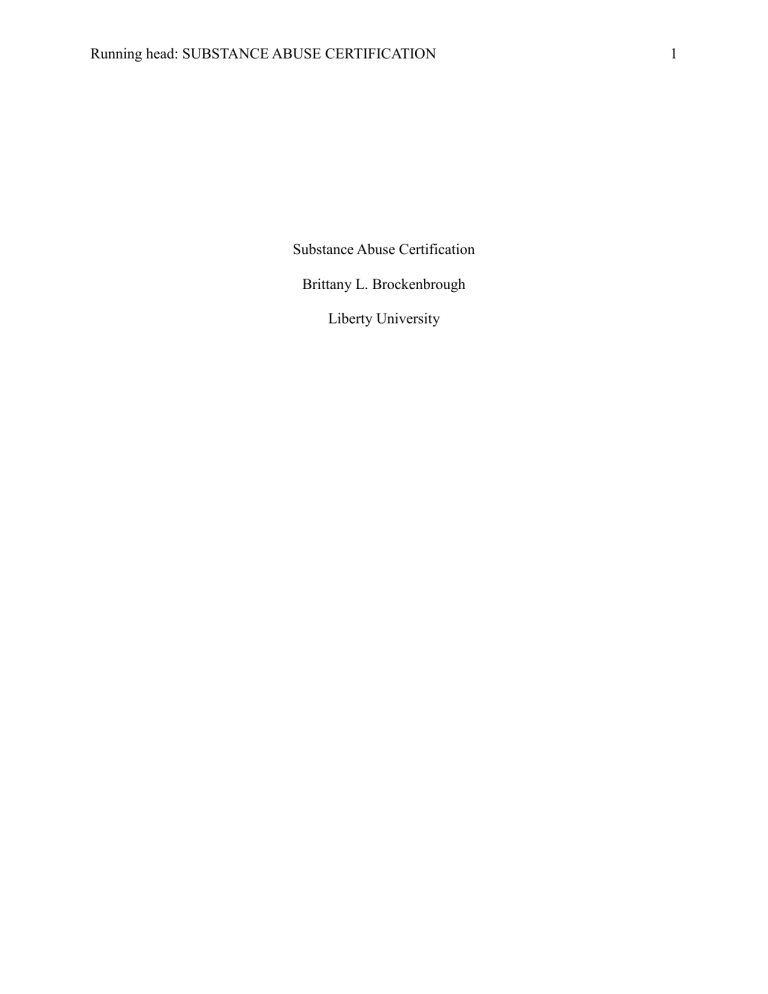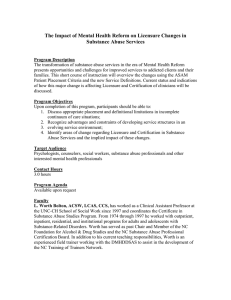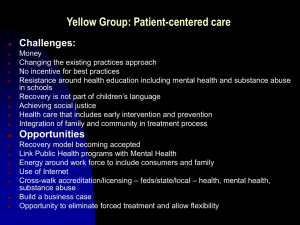
Running head: SUBSTANCE ABUSE CERTIFICATION Substance Abuse Certification Brittany L. Brockenbrough Liberty University 1 SUBSTANCE ABUSE CERTIFICATION 2 Substance Abuse Certification Introduction According to Capuzzi and Stauffer (2016), “certification provides a professional standard and guideline” that allows individuals seeking substance abuse treatment to be assured their clinician will meet minimum competency levels for professionals. In the state of Virginia there are two certifications to gain to become certified to treat substance abuse. The two certifications are the Certified Substance Abuse Counselor (CSAC) and Licensed Substance Abuse Treatment Practitioner (LSATP) as stated by the Virginia Code (2001). After I receive my Master’s in Professional Counseling, I would eventually like to work in an agency or private practice. Having a CSAC or LSATP would allow me greater career flexibility, as I could work in most settings. However, I would like to work in an agency with other Licensed Professional Counselors (LPCs) and Qualified Mental Health Providers (QMHPs). This will allow me to spread my practice across my desired specialties while still helping those with substance abuse issues. Education In Virginia, there are numerous education requirements in order to become certified as a CSAC or LSATP. In order to become a CSAC, which cannot practice independently (“Certification Process Handbook,” 2018), the biggest requirement is a bachelor’s degree (“Virginia Board of Counseling,” 2019). Of course, there is also a required number of didactic training and education. In Virginia, a CSAC must complete 220 clock hours of didactic training and instruction (“Certification Process Handbook,” 2018). There is also a required 180 hours of client interaction performing substance abuse interventions and psychoeducation (“Certification Process Handbook,” 2018). This gives a total of 400 hours of substance abuse education. SUBSTANCE ABUSE CERTIFICATION 3 The education component is also specific for the CSAC education requirements. The following courses are required as part of the didactic training and education: Human behavior dynamics, substance abuse signs and symptoms, case management and continuum of care, relapse prevention and recovery process, treatment approaches, group dynamics, support groups, and adjunctive treatment, crisis intervention, professional identity, and ethics (Jaquith, 2013). These classes all support the CSAC in developing their knowledge In order to gain a certification as an LSATP, the education requirements are more indepth and require more experience and training than a CSAC (“Requirements to Apply,” 2018). LSATPs must have a minimum of a master’s degree in a substance abuse counseling or a similar degree (“Virginia Law,” 2001). This degree must be 60 semester hours. There must also be a 600-hour internship, with 450 hours specific to substance abuse treatment (“Virginia Law,” 2001). In addition to the substance abuse specific internship hours, 240 of them must be face-toface with clients, with 200 of those hours focused on substance abuse interventions. Also, there must be over 4,000 hours of supervised residency, with 2,000 client contact hours at a minimum (“Virginia Law,” 2001). Thankfully graduate level internships are allowed to count towards these requirements. LSATPs must fulfill certain didactic requirements as well, just like CSACs. The following courses are part of the educational requirements for LSATPs to gain their certification: counseling and psychotherapy theories, counseling and psychotherapy techniques, group counseling and psychotherapy, appraisal, evaluation, and diagnosis, psychopathology/abnormal psychology, multicultural counseling, marriage and family systems, professional identity and ethics, and research. These courses allow LSATPs to have fully formed counseling skills to complement their experiences during their training hours. SUBSTANCE ABUSE CERTIFICATION 4 Training As LSATPs are supervisors for CSACs, the training requirements are quite different between the two. There are eight areas of didactic training, each of which has a requirement of a minimum of ten hours per area (“Certification Process Handbook,” 2018). These areas are understanding the dynamics of human behavior, signs and symptoms of substance abuse, treatment approaches and group dynamics, continuum of care and case management, recovery process and relapse prevention, ethics, professional identity, and crisis intervention. In total, there should be 220 hours of didactic training (“Certification Process Handbook,” 2018). After the educational requirements are met, then the individual must complete 180 hours of training in performing substance abuse tasks with clients (“Certification Process Handbook,” 2018). LSATPs have a much more intensive training road ahead of them. LSATPs are expected to complete a 4,000-hour residency. This residency needs to include at least 2,000 hours of client contact as well (Jaquith, 2013). Thankfully, internship hours at the graduate level do count, so applicants don’t have to worry about trying to spend all their time and energy fulfilling these hour requirements in order to apply. In addition to the client contact hours and residency requirements, there must also be supervision hours, with at least 20 hours of on-site supervision and 20 hours of off-site supervision (Jaquith, 2013). The Board of Counseling does allow off-site supervision to take place in a group setting (“Certification Process Handbook,” 2018). LPCs are allowed to act as supervisors LSATP supervision as long as they have an unrestricted license in Virginia and have at least two years of post-licensure training and experience in the field and has received training in supervision activities (“Requirements to Apply,” 2018). Any internship that is not part of a CACREP-accredited program may count for up to 600 hours. Once they are certified, LSATPs may supervise CSACs, but they must apply for supervision with the Virginia SUBSTANCE ABUSE CERTIFICATION 5 Board of Counseling, with a total of 200 supervision hours (100 hours of which can be completed in a group setting) completed before they can supervise CSACs. CSACs have similar training, just not as in-depth or as long a time period. Of the 400 hours of education and training required, over 180 must be spent in experiential practices with clients (“Certification Process Handbook,” 2018). There are also eight areas required by the Virginia Board of Counseling that a CSAC must complete at least ten hours in. Those areas are human behavior dynamics, substance abuse signs and symptoms, case management and continuum of care, relapse prevention, recovery process and treatment approaches, group dynamics and support groups, crisis intervention, professional identity, and ethics (“Certification Process Handbook,” 2018). In addition to these hours there must be at least 20 hours apiece in group counseling and substance abuse counseling treatment and planning and substance abuse research. Overall, there also needs to be an accrual of 2,000 hours of experience in a residency, with 100 hours of supervision, with up to 50 of those hours allowed to take place in a group setting. CSACs must be supervised by an individual with one of the following credentials: LPC, Licensed clinical social worker (LCSW), Licensed marriage and family therapist (LMFT), medical doctor (MD), or a registered nurse (RN). All of these may supervise as long as they meet the requirements set by the Virginia Board of Counseling (“Certification Process Handbook,” 2018), which can include national certifications and experiential requirements. Exam Both CSACs and LSATPs must take an exam in order to gain certification in Virginia. CSACs must take the National Certified Addiction Counselor, Level I (NCAC-I) exam (“Certification Process Handbook,” 2018). This allows them the ability to apply for licensure as a CASC in Virginia (“Virginia Law,” 2001). LSATPs must take the Examination for Master SUBSTANCE ABUSE CERTIFICATION 6 Addictions Counselor (“Requirements to Apply,” 2018). Both of these exams are scheduled and administered by the National Certification Commission for Addiction Professionals, with a fee paid for each exam (“Certification Process Handbook,” 2018). The exams are graded, and scores are made available 2-4 weeks after the testing period. Certifications and wall certificates are mailed to individuals who passed the exam 7-10 days after CSAC licensure approval. However, if an individual were to fail the exam, it may be repeated after 90 days (“Certification Process Handbook,” 2018). Work Work environments for CSACs and LSATPs are the same, with agencies, private practices, and government substance abuse facilities all being sites for employment (“Details Report,” 2019). Much of the work involves face-to-face discussions, an indoor working environment, contact with clients for assessments, and group counseling (“Details Report,” 2019). There are many tasks to complete in this work environment, including assessments, record creation and maintenance, development and modification of treatment plans, and formal and informal client interviews. Also, a CASC or LSATP may be required to work with the clients’ families to create person-centered care plans and provide psychoeducational training. There is also coordination with other agencies and government organizations, such as law enforcement organizations, mental health inpatient treatment facilities, social services, and drug cessation programs, such as methadone programs for opioid addicts (“Details Report,” 2019). Tools used in this profession include paper and electronic assessments, alcohol analyzers, and computers to generate and store records (“Details Report,” 2019). SUBSTANCE ABUSE CERTIFICATION Practice Standards CASCs and LSATPs must be trained in administering assessments to those suffering from substance abuse issues and addiction problems. It is helpful to remember CASCs and LSATPs provide both screenings and assessments to clients, and that there is a difference between the two. Screening is a process for evaluating for a specific problem, such as substance abuse, whereas an assessment is used to define the problem behavior(s), assist in obtaining a diagnosis, and develop a treatment plan. Screenings are usually able to be done with little to no training in the screening tool, while assessments are more involved and require training in order to properly administer them (“Substance Abuse Treatment,” 2009). The biggest consideration when selecting assessments are making sure the assessment is culturally sensitive and appropriate for the client, as well as making sure it has high levels of validity and reliability (“Substance Abuse Treatment,” 2009). 7 SUBSTANCE ABUSE CERTIFICATION 8 References Capuzzi, D., & Stauffer, M. D. (2016). Foundations of addictions counseling (3rd ed.). Boston: Pearson. Certification process handbook for CSACs and CSAC-As, Certification process handbook for CSACs and CSAC-As (2018). Richmond, VA. (2019). Certified Substance Abuse Counselor (CSAC) Salary and Career Facts. Retrieved from https://learn.org/articles/Certified_Substance_Abuse_Counselor_CSAC_Salary_and_Car eer_FAQs.html (2019). Details Report for: 21-1011.00 - Substance Abuse and Behavioral Disorder Counselors. Retrieved from https://www.onetonline.org/link/details/21-1011.00 Jaquith, W. (2013). Virginia Counseling Code. Retrieved from https://vacode.org/2016/54.1/III/35/1.1/ Requirements to apply by endorsement for LSATP licensure, Requirements to apply by endorsement for LSATP licensure (2018). Richmond, VA. (2009). Substance Abuse Treatment: Addressing the Specific Needs of Women. Retrieved from https://www.ncbi.nlm.nih.gov/books/NBK83252/ (2019). Virginia Board of Counseling Guidance Documents. Retrieved from http://www.dhp.virginia.gov/counseling/counseling_guidelines.htm (2001). Virginia Law. Retrieved from https://law.lis.virginia.gov/vacode/54.1-3507/


